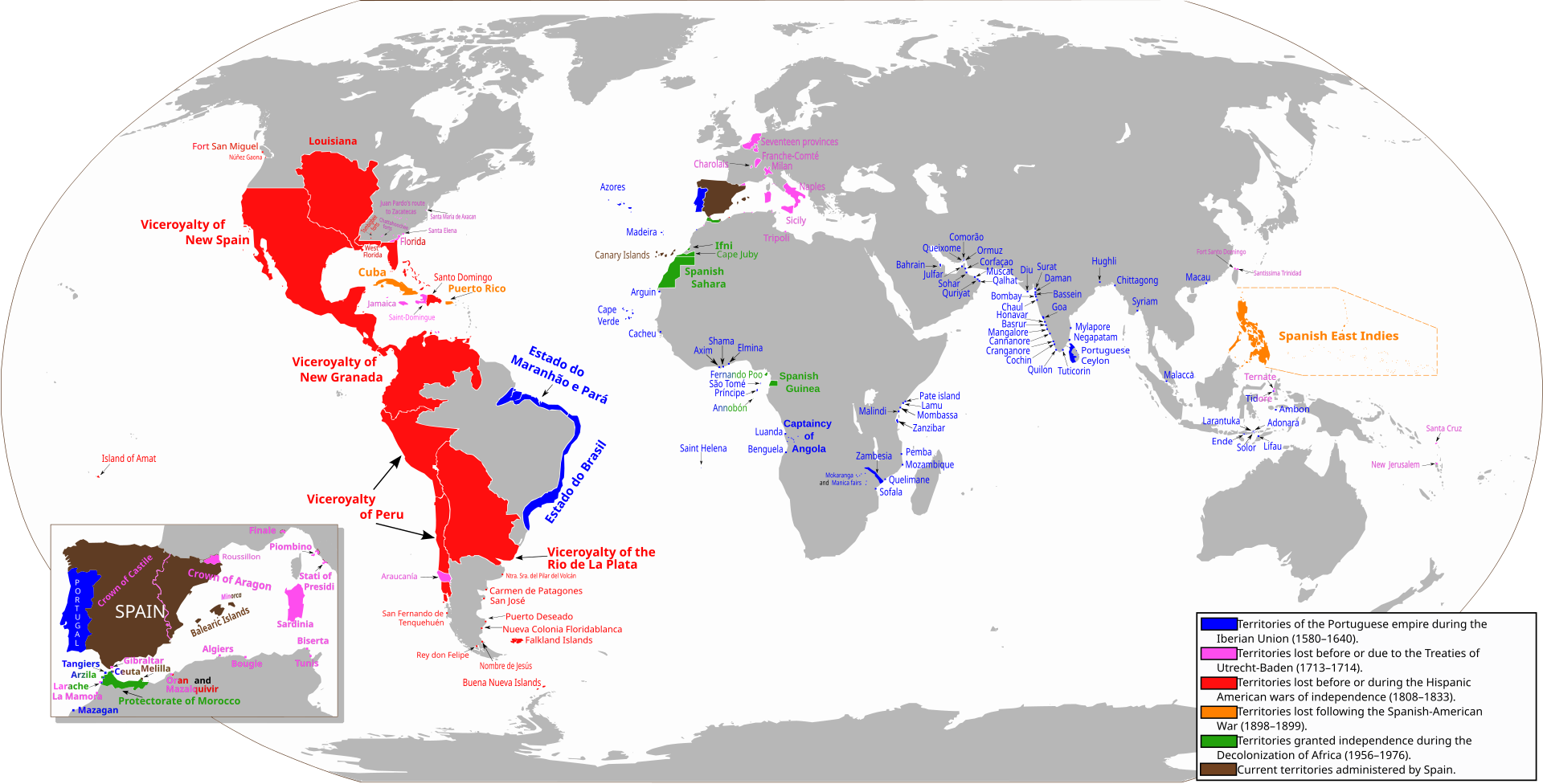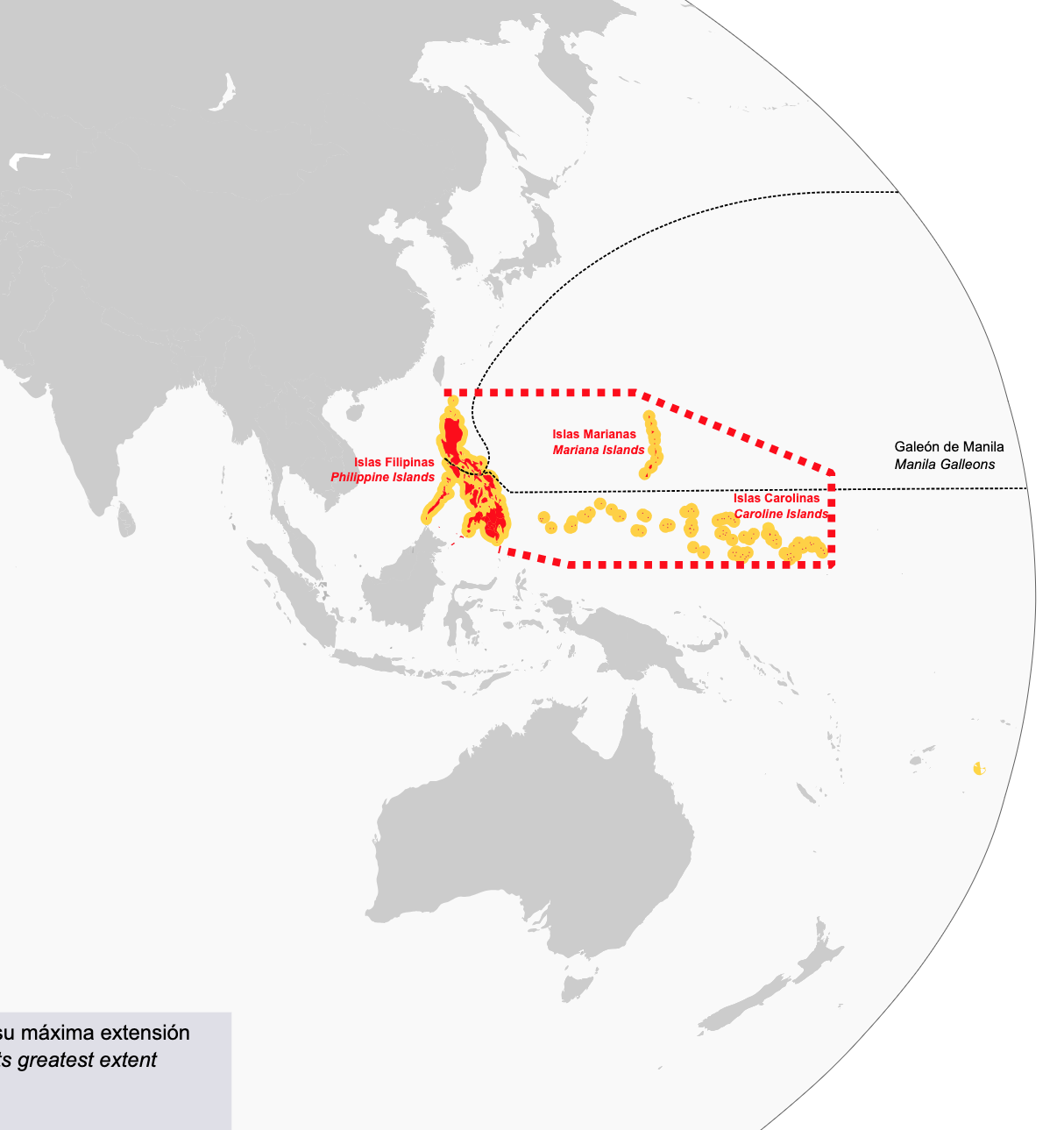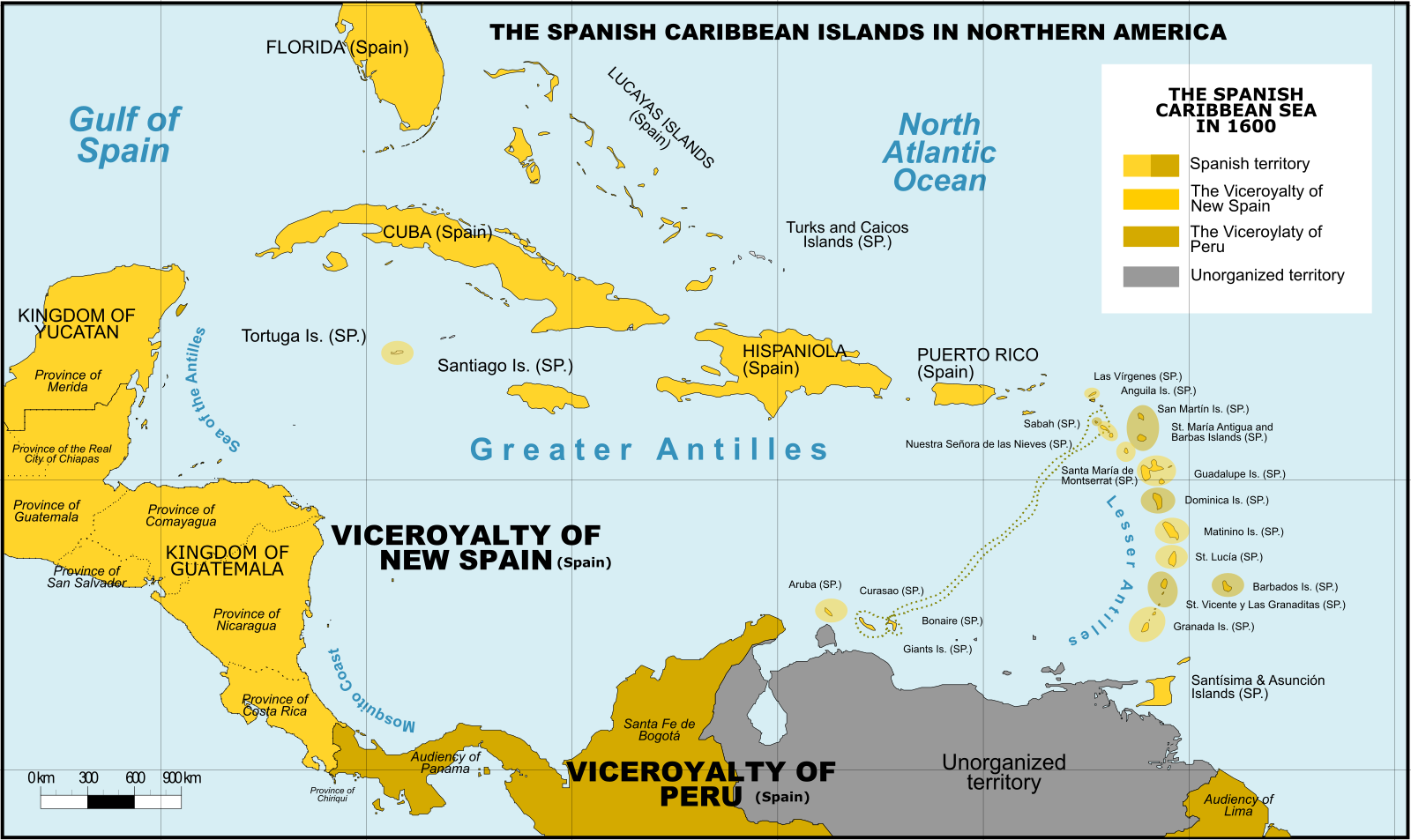
スペインの帝国主義
The
Spanish Imperialism
☆ 植民地時代のスペイン帝国主義は、スペイン帝国の興亡と一致しており、一般的に1402年のカナリア諸島征服をもって始まったと認識されている。大航海時 代における探検航海の成功を受けて、スペインは大西洋を越えた大規模な遠征作戦を遂行できる強力な海軍を整備するために、相当な財政的・軍事的資源を投入 した。これにより、北米、南米、およびカリブ海地域の大半に帝国の確固たる存在を確立し、強化することを目指した。スペインによる大西洋横断探検航海の支 援と後援に伴い、コンキスタドールが派遣され、領土や植民地の獲得と開発を通じてスペインの帝国の境界がさらに拡大した。

Imperio
Español (Reino de España y de las Indias) en su máxima extensión
Spanish Empire (Kingdom of Spain and the Indies) at its greatest extent
1790
Spain The areas of the world that at one time were territories of the Spanish Empire Main article: Spanish Empire Spanish imperialism in the colonial era corresponds with the rise and decline of the Spanish Empire, conventionally recognized as emerging in 1402 with the conquest of the Canary Islands. Following the successes of exploratory maritime voyages conducted during the Age of Discovery, Spain committed considerable financial and military resources towards developing a robust navy capable of conducting large-scale, transatlantic expeditionary operations in order to establish and solidify a firm imperial presence across large portions of North America, South America, and the geographic regions comprising the Caribbean basin. Concomitant with Spanish endorsement and sponsorship of transatlantic expeditionary voyages was the deployment of Conquistadors, which further expanded Spanish imperial boundaries through the acquisition and development of territories and colonies.[143] Imperialism in the Caribbean basin  Spanish colonies and territories in the Caribbean basin (c. 1490 – c. 1660) In congruence with the colonialist activities of competing European imperial powers throughout the 15th – 19th centuries, the Spanish were equally engrossed in extending geopolitical power. The Caribbean basin functioned as a key geographic focal point for advancing Spanish imperialism. Similar to the strategic prioritization Spain placed towards achieving victory in the conquests of the Aztec Empire and Inca Empire, Spain placed equal strategic emphasis on expanding the nation's imperial footprint within the Caribbean basin. Echoing the prevailing ideological perspectives regarding colonialism and imperialism embraced by Spain's European rivals during the colonial era, including the English, French, and the Dutch, the Spanish used colonialism as a means of expanding imperial geopolitical borders and securing the defense of maritime trade routes in the Caribbean basin. While leveraging colonialism in the same geographic operating theater as its imperial rivals, Spain maintained distinct imperial objectives and instituted a unique form of colonialism in support of its imperial agenda. Spain placed significant strategic emphasis on the acquisition, extraction, and exportation of precious metals (primarily gold and silver). A second objective was the evangelization of subjugated indigenous populations residing in mineral-rich and strategically favorable locations. Notable examples of these indigenous groups include the Taίno populations inhabiting Puerto Rico and segments of Cuba. Compulsory labor and slavery were widely institutionalized across Spanish-occupied territories and colonies, with an initial emphasis on directing labor towards mining activity and related methods of procuring semi-precious metals. The emergence of the Encomienda system during the 16th–17th centuries in occupied colonies within the Caribbean basin reflects a gradual shift in imperial prioritization, increasingly focusing on large-scale production and exportation of agricultural commodities. Scholarly debate and controversy The scope and scale of Spanish participation in imperialism within the Caribbean basin remains a subject of scholarly debate among historians. A fundamental source of contention stems from the inadvertent conflation of theoretical conceptions of imperialism and colonialism. Furthermore, significant variation exists in the definition and interpretation of these terms as expounded by historians, anthropologists, philosophers, and political scientists. Among historians, there is substantial support in favor of approaching imperialism as a conceptual theory emerging during the 18th–19th centuries, particularly within Britain, propagated by key exponents such as Joseph Chamberlain and Benjamin Disraeli. In accordance with this theoretical perspective, the activities of the Spanish in the Caribbean are not components of a preeminent, ideologically driven form of imperialism. Rather, these activities are more accurately classified as representing a form of colonialism. Further divergence among historians can be attributed to varying theoretical perspectives regarding imperialism that are proposed by emerging academic schools of thought. Noteworthy examples include cultural imperialism, whereby proponents such as John Downing and Annabelle Sreberny-Modammadi define imperialism as "...the conquest and control of one country by a more powerful one."[144] Cultural imperialism signifies the dimensions of the process that go beyond economic exploitation or military force." Moreover, colonialism is understood as "...the form of imperialism in which the government of the colony is run directly by foreigners."[145] In spite of diverging perspectives and the absence of a unilateral scholarly consensus regarding imperialism among historians, within the context of Spanish expansion in the Caribbean basin during the colonial era, imperialism can be interpreted as an overarching ideological agenda that is perpetuated through the institution of colonialism. In this context, colonialism functions as an instrument designed to achieve specific imperialist objectives. |
スペイン かつてスペイン帝国の領土であった世界の地域 詳細は「スペイン帝国」を参照 植民地時代のスペイン帝国主義は、スペイン帝国の興亡と一致しており、一般的に1402年のカナリア諸島征服をもって始まったと認識されている。大航海時 代における探検航海の成功を受けて、スペインは大西洋を越えた大規模な遠征作戦を遂行できる強力な海軍を整備するために、相当な財政的・軍事的資源を投入 した。これにより、北米、南米、およびカリブ海地域の大半に帝国の確固たる存在を確立し、強化することを目指した。スペインによる大西洋横断探検航海の支 援と後援に伴い、コンキスタドールが派遣され、領土や植民地の獲得と開発を通じてスペインの帝国の境界がさらに拡大した。[143] カリブ海地域における帝国主義  カリブ海地域におけるスペインの植民地と領土(1490年頃~1660年頃) 15世紀から19世紀にかけてのヨーロッパの競合する帝国主義勢力の植民地主義的活動と歩調を合わせるように、スペインもまた地政学上の権力を拡大するこ とに熱中した。カリブ海地域はスペインの帝国主義を拡大する上で重要な地理的中心地として機能した。スペインがアステカ帝国とインカ帝国の征服で勝利を収 めるために戦略的に優先したのと同様に、スペインはカリブ海地域における帝国の足跡を拡大することに同等の戦略的優先度を置いた。 スペインのヨーロッパのライバル国(イギリス、フランス、オランダなど)が植民地時代に抱いていた植民地主義と帝国主義に関する一般的なイデオロギー的見 解と同様に、スペインは帝国の地政学的境界を拡大し、カリブ海地域の海上貿易ルートの防衛を確保する手段として植民地主義を利用した。 帝国主義のライバル国と同じ地理的活動領域で植民地主義を活用しながらも、スペインは独自の帝国主義的目標を維持し、帝国主義的計画を支援する独自の植民 地主義の形態を導入した。スペインは貴金属(主に金と銀)の獲得、採掘、輸出に戦略的な重点を置いていた。2つ目の目的は、鉱物資源が豊富で戦略的に有利 な場所に住む征服した先住民の改宗であった。これらの先住民の代表的な例としては、プエルトリコやキューバの一部に住むタイノ族が挙げられる。スペイン領 および植民地では、強制労働や奴隷制度が広く制度化され、当初は採掘活動や半貴金属の調達に関連する労働に重点が置かれていた。カリブ海地域内の植民地で 16世紀から17世紀にかけてエンコミエンダ制度が確立されたことは、帝国の優先事項が徐々に変化し、農産物の大規模生産と輸出に重点が置かれるように なったことを反映している。 学術的な議論と論争 カリブ海地域におけるスペインの帝国主義への関与の範囲と規模については、歴史家たちの間で学術的な議論が続いている。 論争の根本的な原因は、帝国主義と植民地主義の理論的概念を不用意に混同していることにある。 さらに、歴史家、人類学者、哲学者、政治学者が提示するこれらの用語の定義と解釈には、大きな違いがある。 歴史家の間では、帝国主義を18世紀から19世紀にかけて、特にイギリスで生まれた概念理論として捉える見方が有力である。この理論的観点によれば、スペ インによるカリブ海での活動は、卓越した、イデオロギー主導型の帝国主義の一形態ではない。むしろ、これらの活動は、より正確には植民地主義の一形態と分 類される。 歴史家たちの意見がさらに分かれるのは、台頭しつつある学派が提唱する帝国主義に関する理論的視点が様々であるためである。注目すべき例としては、ジョ ン・ダウニングやアナベル・スレーベルニー=モダマディといった支持者たちが「...より強力な国による他国の征服と支配」と定義する文化的帝国主義があ る。[144] 文化的帝国主義は、経済的搾取や軍事力行使を越えたプロセスの次元を意味する。さらに、植民地主義は「植民地の政府が外国人によって直接運営される帝国主 義の形態」と理解されている。 歴史家たちの帝国主義に対する見解は分かれており、学術的な見解の一致は見られないものの、植民地時代におけるスペインのカリブ海地域への拡大という文脈 においては、帝国主義は植民地主義という制度を通じて永続する包括的なイデオロギー的課題として解釈することができる。この文脈において、植民地主義は特 定の帝国主義的目標を達成するための手段として機能する。 |
| https://en.wikipedia.org/wiki/Imperialism |
|
★植民地の統治ハイアラキー
スペイン植民地の行政区画(ピコン-サラス 1973:273)
リ ンク
文 献
そ の他の情報
Copyleft,
CC, Mitzub'ixi Quq Chi'j, 1996-2099